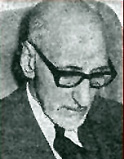Ali Dashti
Ali Dashti (also Ali Dashti , Persian علی دشتی ʿAli Daschti , DMG ʿAlī Daštī ; * around 1894 in Karbala ; † January 16, 1982 in Tehran ) was an Iranian MP, a member of the Edalat Party (Justice Party) and later a senator. Dashti was a journalist and editorby profession.
Life
Ali Dashti was born in Karbala in 1894 into a Shiite religious family. His father Sheikh Abdul Hussein Daschtestani was a minister and allowed him in Karbala and Najaf , a theology and history studies at schiitisch- theological theology schools. In 1918 he returned to his homeland and wore the robes of an Islamic scholar there until he decided against a career as a clergyman and devoted himself to journalism.
Act
In 1919 he was briefly imprisoned for critical articles on the Anglo-Iranian state treaty concluded between the British and Iranian governments after the end of the First World War . For thirteen years, from 1922 to 1935, Ali Dashti was the editor of the Shafaq-e Sorkh (Red Twilight) newspaper, which he founded . In 1927 he received an invitation to the tenth anniversary of the communist October Revolution in the Soviet Union . In 1928 Dashti won the election to the Bushehr representative in the Persian parliament . Another arrest in 1935 resulted in another fourteen months of house arrest . From 1939 and from 1941 to 1943 he was again a member of parliament for the Damavand district (near Tehran). In 1946 he was imprisoned for six months because he had taken a position against the granting of oil concessions to the Soviet Union. This was followed by a two-year stay in France from 1946 to 1948. In 1954 he was appointed Senator of the Iranian Senate , the second parliamentary chamber of Iran, by Shah Mohammad Reza Pahlavi . In 1963 he was ambassador to Lebanon for one year .
Positions
Prior to 1937, Dashti had only generally defended rational thinking and criticized blind faith, since belief can dull human reason and common sense, including the mind of learned scientists. From March 1973 the Islam-critical manuscript "23 Years" appeared in the journal Kaweh in the feature section, starting with number 45 in sequels. The manuscript was written in 1937, but was not published until 1973. In his text, later published as a book in Beirut, Dashti turned against the Muslims' belief in miracles and denied that the Koran came from God himself. Dashti said that the Koran did not contain anything really new that had not been said or written by others before. The stories contained in the Koran came either from texts by Jews or Christians, whose clergy Mohammed had met several times on his travels to Syria, as well as from the oral tradition of Arab tribes, according to Dashti in "23 Years". Because of his worldview, he came under considerable pressure after the Islamic Revolution . Despite his old age, he was ill-treated and injured in prison. He succumbed to suffering three years after the outbreak of political upheaval.
Works
Dashti was the author of many books, only a few of them:
- 23 years. The Prophet Muhammad's Career. Edited by Bahram Choubine and Judith West, Alibri, Aschaffenburg 2003, ISBN 3-932710-80-0
- In Search of Omar Khayyam. Translated from the Persian by LPelwell-Sutton. Columbia University Press, 1971. ISBN 0-231-03188-2 .
- Ayyam-e Mahbas (Prison Days ) ( 1922 )
- Collections of short stories:
- Literature by and about Ali Daschti in the catalog of the German National Library
Web links
- Daschti's book: 23 years: A Study of the Prophetic Career of Mohammad ( Memento from March 12, 2012 in the Internet Archive ) ( Persian )
supporting documents
- ^ JE Knörzer: Daštī, ʿAlī. In: Encyclopaedia Iranica . Ehsan Yarshater , 1994, accessed June 15, 2015 .
| personal data | |
|---|---|
| SURNAME | Dashti, Ali |
| ALTERNATIVE NAMES | علی دشتی (Persian) |
| BRIEF DESCRIPTION | Iranian Shiite scholar, journalist and member of the Edalat Party (Justice Party) in Iran |
| DATE OF BIRTH | around 1894 |
| PLACE OF BIRTH | Karbala |
| DATE OF DEATH | January 16, 1982 |
| Place of death | Tehran |
